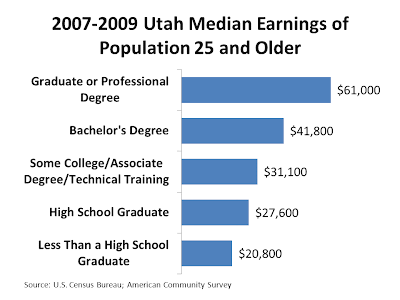


Bachelor's degrees or technical training. . .Which is better? Of course, on an individual level that's a very personal question. Obviously, college isn't for everyone. And, I'm personally glad that there are people who choose not to go to college. . .because I really don't want to do my own dry cleaning, plumbing, or fix my car. Each individual has different abilities and interests. Fortunately, the labor market has opportunities for individuals with a wide variety of educational attainment and abilities.
On the other hand, data does tell a story about the benefits of higher education. First, the higher an individual's educational attainment, the less likely they are to be unemployed (see the accompanying chart). Incidentally, we see the same pattern with unemployment insurance claims. Second, in general, income and earnings are higher (see the second chart). Third, there are more openings in Utah for people with at least a bachelor's degrees than for individuals with technical/associate degrees (see the third chart).
Individuals with at least a bachelor's degree pay more taxes and are less of a drain on social services. They are healthier. If you want to read a detailed accounting of the fiscal impacts adult education check out this report by the Center for Labor Market studies.
Plus, we shouldn't get too hung up on field of study. Obviously, even people with sociology and history degrees--which might seem unmarketable--are employed. Just look at the unemployment rates for people with degrees. Out in the labor market many, many positions require bachelor's degrees, but aren't very particular about the field of study. Check around with your professional friends and acquaintances. Personally, I know high-level managers and professionals with degrees in history, sociology, English, psychology etc.
Finally, students of economics will be glad to know that markets do work. In Utah, the number of jobs that require at least bachelor's degree is roughly equivalent to the share of the labor force that has a bachelor's degree or higher.